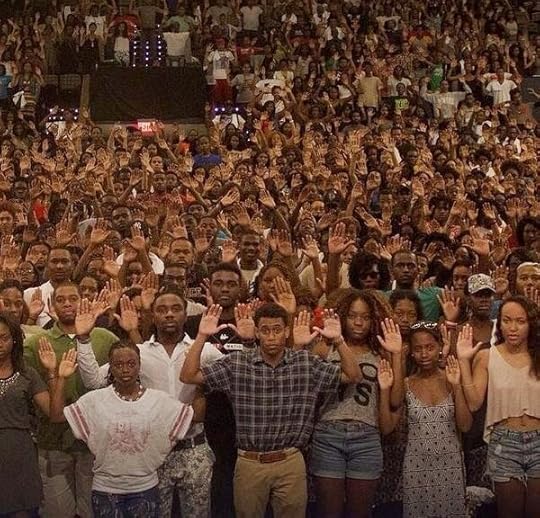Ferguson ��� ���We Don���t All Look Alike���
 Photo Credit: Megan Sims @The_Blackness48, Howard University Student Body via USATodayA quiet rage has been inside me since the shooting ofMichael Brown on August 15 ���a rage I kept under control as I tried to be objective, and resist beingmanipulated by the strident and predictable rhetoric surrounding this senselesskilling. However, as I watched Michael���sfuneral, that rage burned hot. It broughtto mind the senseless and tragic deaths of other young Black men: Eric Garner, age 43 on July 17, 2014 in StatenIsland, NY; Trayvon Martin, age17 on February 26, 2012 in Sanford, FL. I couldn���t help recalling the horrifying murderof Emmett Louis Till, age 14 on August 28, 1955 in the Mississippi Delta. His body was fished out of the TallahatchieRiver after being beaten and shot in the head. The image of his mutilated and bloated body is still seared in mymemory.
Photo Credit: Megan Sims @The_Blackness48, Howard University Student Body via USATodayA quiet rage has been inside me since the shooting ofMichael Brown on August 15 ���a rage I kept under control as I tried to be objective, and resist beingmanipulated by the strident and predictable rhetoric surrounding this senselesskilling. However, as I watched Michael���sfuneral, that rage burned hot. It broughtto mind the senseless and tragic deaths of other young Black men: Eric Garner, age 43 on July 17, 2014 in StatenIsland, NY; Trayvon Martin, age17 on February 26, 2012 in Sanford, FL. I couldn���t help recalling the horrifying murderof Emmett Louis Till, age 14 on August 28, 1955 in the Mississippi Delta. His body was fished out of the TallahatchieRiver after being beaten and shot in the head. The image of his mutilated and bloated body is still seared in mymemory.Before youwrite me off for strident and predictable rhetoric of my own, you must knowthat these killings are not the only ones that have me incensed. I am likewise enraged by the murders of thousands of young African American men in places like Chicago, Detroitand Philadelphia, where the killers happened to be Black. I have lost personal friends in ���drive-by���shootings, simply because they happened to be in the wrong place at the wrongtime. In the case of Emmett Till, the motive was clearly racism. The cases of Michael, Eric and Trayvon certainly involved racism, but otherimportant factors were involved. Racism alonecannot account for the countless Black on Black murders that happen withregularity across the country. In thefinal analysis, the race of the one who pulls the trigger makes no differencebecause the result is the same: one more dead African American young man,gunned down for unclear reasons.
Part of what outrages me is the self-appointed andopportunistic Black gatekeepers who continue to frame all of our tragedies only in terms of racism. By so doing, they cannot account for Black onBlack murders because they don���t fit their ���racism-is-our only-hindrance��� scenario. Obviously, racism is an ongoing issue weface, but it is not the only issue. Surely we have a long way to go as a society,but most would agree that while racism is alive and well, it is not the monsterit once was. The specter of the past is quickly being eclipsed by aclash of value systems.
We are in the midst of a cultural crisis amongst ourselves,and the events in Ferguson have illustrated it. Part of this crisis is today���s ongoing battlebetween those who are ���life affirming��� and those who are ���life denying.��� The former are pro-Black because they are pro-human and the latter are anti-Black because they are anti-human.
Generally speaking, life-affirmers are the dominantinfluence in any culture. However,lately life-deniers have gained an inordinate influence in African Americanculture. Acting as wolves in Blacksheep���s clothing, they disguise themselves as pro-Black, while carrying and pursuingan anti-Black agenda.
The peacefulprotesters in Ferguson seem to have been motivated by the violation of theirlife-affirming sensibilities, andrightfully so. The root of the community���sunrest was decades of frustration with the American justice system that hadfailed them for so long.
At the firstsign of unrest, life-denying troublemakers, mostly from outside of Ferguson,rushed in to exploit the situation. They included:
1) The opportunists ��� Those with no concern for justice or truth, who attempted to manipulate Ferguson���s vulnerable citizens with inflammatory rhetoric. Their chief concern was getting into the headlines to further their grievance industry agenda;
2) The criminals ��� Those interested in immediate personal gain by looting, burning and stealing property from Ferguson���s vulnerable citizens;
3) The nihilists ��� Agitators interested in the destruction of the social order for destruction���s sake. They deny that anything is valuable, neither Ferguson lives nor Ferguson property, or peaceful Ferguson values. These nihilists tried to provoke police violence with gunfire and by hurling Molotov cocktails and bottles of urine.
These anti-Black intruders and provocateurs had no concernfor the tragedy of Michael Brown���s killing aside from the gain the caseprovided for their own agenda. Theyneither had respect for Michael���s family nor interest in the true advancementof African Americans. They were like atsunami that overwhelmed the situation ��� sweeping others up in a dominating dynamicof their creation.
The opportunists consistently and willfully ignore the anti-Blackcriminals and nihilists. Recognition does not fit their narrative, and to makesuch an acknowledgment would expose their own anti-Black agenda. If criminals and nihilists began thinking forthemselves, or even began to think betterof themselves, they would realize they too are being exploited, robbing theopportunists of their base for a lucrative, guilt-manipulating hustle. Thus the opportunists��� survival necessitatesframing issues like Ferguson only inracial terms.
For wisdom, we need to look past the rhetoric of theopportunists to the original ideologues of modern Blackness, and how theydefined Blackness itself ��� men like Malcolm X, Stokely Carmichael and FloydMcKissick. They all stated that being ���Black���involved more than the amount of pigment in one���s skin. ���Blackness��� was a state of mind, involving thevalues one lived by. To that end, Dr. Maulana ���Ron��� Karenga soughtto buttress Blackness with a clear set of values. In 1966, he created Kwanzaa to connectAfrican Americans with their African cultural roots and to enshrine life affirmingvalues into Black consciousness; values such as faith, purpose,self-determination, and cooperative economics, to name a few.
In essence, the pioneers of modern Blackness were all inagreement that in order to be Black onehad to think Black, and to think Black was to affirm life in the mostpositive of terms. A life-denyinglifestyle had no place in the matrix of early Black consciousness; suchthinking was recognized and condemned as anti-Black. Today, those distinctions have disappeared.
We rightfully protest, then, when those in the dominantculture sweepingly state, ���we all look alike,��� ���Ferguson is looting and burningits own community,��� and other erroneous statements that consign Black people toa monolithic status. We are not all thugsand degenerates. I propose that thismentality led to the initial militaristic overreaction of the police to theFerguson protesters ��� overreactions that provoked more waves of anger thatbecame its own vicious cycle. Much ofthe news media also played the ���we-all-look-alike��� game as they rhetoricallyconflated ���peaceful protesters��� with ���rioters.���
We don���t all lookalike; no group is monolithic, and we cannot all be lumped into the samecategories. Unfortunately, we treatourselves as if this misguided notion is true when we include life-denyingimposters as if they are ���authentically Black.��� We continue to make this mistake in the name of ���political correctness,���and Ferguson teaches us that this is to our detriment.
Michael Brown himself stands as the hinge-pin between thesetwo positions. He has come to exemplifythe struggle between authentic Blackness and anti-Blackness, between theaffirmation of life and its denial. MichaelBrown, like so many other young Black men, had one foot in pro-Blackness as hewas headed for college, and the other foot in anti-Blackness as he was seen onvideo stealing from a convenience store. Despite the best efforts of his mother and father, he was without avalue-based sense of Blackness, and he was ���at risk��� because he was culturally adrift��� primed to be cut down by the forces of "they-all-look-alike-ism."
Had Brown not been cut down, he may have grown into a morelife affirming position; perhaps as an internationally renowned neurosurgeon, anationally syndicated newscaster, a White House cabinet member, a militarygeneral, a preacher of the Gospel, or perhaps as a simple and ordinary man wholoves his wife and leads his family well, like so many who sit in ourcongregations every Sunday. Sadly, wewill never know.
It is time to rediscover the values that originallyempowered ���Blackness,��� allowing it to become the paradigm-shifting positiveforce it was from its inception. To dothat, we need to rediscover biblical wisdom. Wise application of the Word of God to ourlife situations, our identity and our purpose was the powerhouse that gave 19thCentury African American theologians the foundational truths upon which historicand modern ���Blackness��� was built ��� theologians like Rev.Henry Highland Garnet, Rev. Alexander Crummell and Rev. Henry McNeal Turner toname a few.
We must mourn the heartbreaking death of Michael Brown andothers like him across the country. Aswe do, we must also recognize that these unnecessary deaths are part of acultural death ��� the death of Blackness itself at the hands of life-denying,anti-Blackness.
This post originally appeared on Ed Stetzer's The Exchange , Hosted by Christianity Today.
Published on September 01, 2014 04:07
No comments have been added yet.
Carl F. Ellis Jr.'s Blog
- Carl F. Ellis Jr.'s profile
- 14 followers
Carl F. Ellis Jr. isn't a Goodreads Author
(yet),
but they
do have a blog,
so here are some recent posts imported from
their feed.



